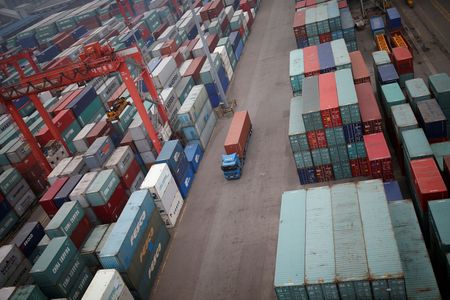By Jihoon Lee and Choonsik Yoo
SEOUL (Reuters) -South Korea’s exports in November suffered their worst annual drop in 2-1/2 years, hurt by cooling global demand in major markets led by China and a downturn in the semiconductor industry, data showed on Thursday.
The bleak data reinforces the market’s view that Asia’s fourth-largest economy, which relies more heavily on exports for growth than bigger advanced economies, would lose momentum quickly after posting rapid expansion early this year.
Economists said China’s possible loosening of its strict COVID-fighting curbs could give a quick boost to exports there, but any lasting effect would still be limited by cooling global demand.
“The U.S. is the final destination for information-technology products such as chips even if they are first shipped to China, and demand in the U.S. doesn’t look strong,” said Gweon Hee-jin, an economist at KB Securities.
Outbound shipments from South Korea slumped 14.0% from a year earlier to $51.91 billion last month, the steepest decline since May 2020 and compared with a 5.7% fall in October and an 11.0% drop tipped in a Reuters survey.
South Korea is the first major exporting economy to report monthly trade data for products ranging from key electronics to cars and ships, and thus provides an early glimpse into the health of global growth and manufacturing.
Markets shrugged off the data as investors focused more on the U.S. Federal Reserve’s policy moves.
Shipments to China, the top market, dropped 25.5% in November, marking their sixth straight month of declines and the worst in more than a decade since May 2009. Sales to the United States and the European Union rose 8.0% and 0.1%, respectively.
Global recession risks and a resurgence in COVID-19 infections in China have dragged on South Korea’s exports over recent months. Demand conditions worldwide have weakened as many major economies raise borrowing costs aggressively to fight a surge in inflation.
Imports in November rose 2.7% to $58.93 billion, following a 9.9% increase a month before and compared with a 0.2% gain expected by economists.
Overall, the country posted a monthly trade deficit of $7.01 billion in November, bigger than a $6.70 billion shortfall in the previous month and its eighth consecutive month in the red.
(Reporting by Jihoon Lee and Choonsik YooEditing by Shri Navaratnam and Raju Gopalakrishnan)

